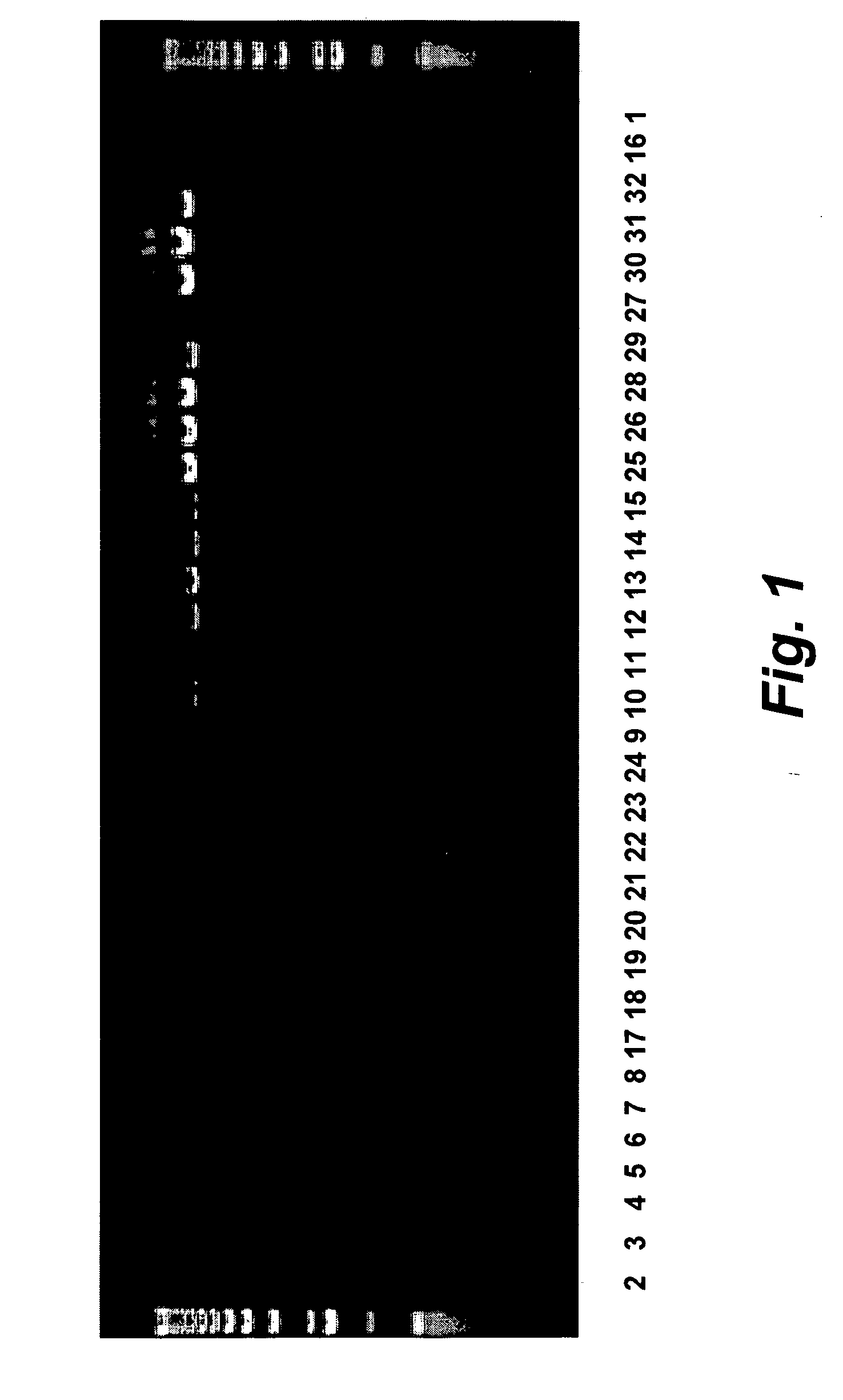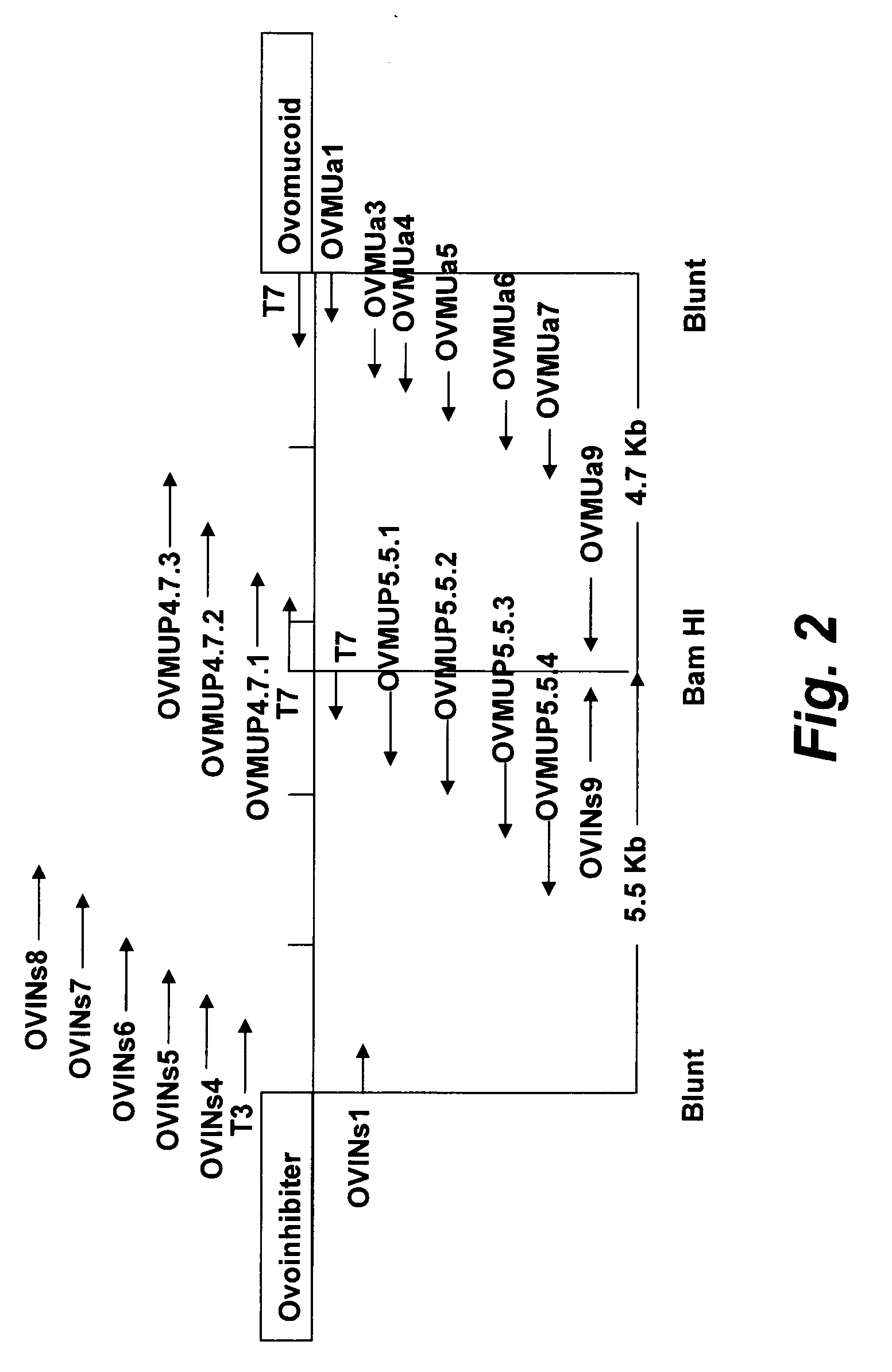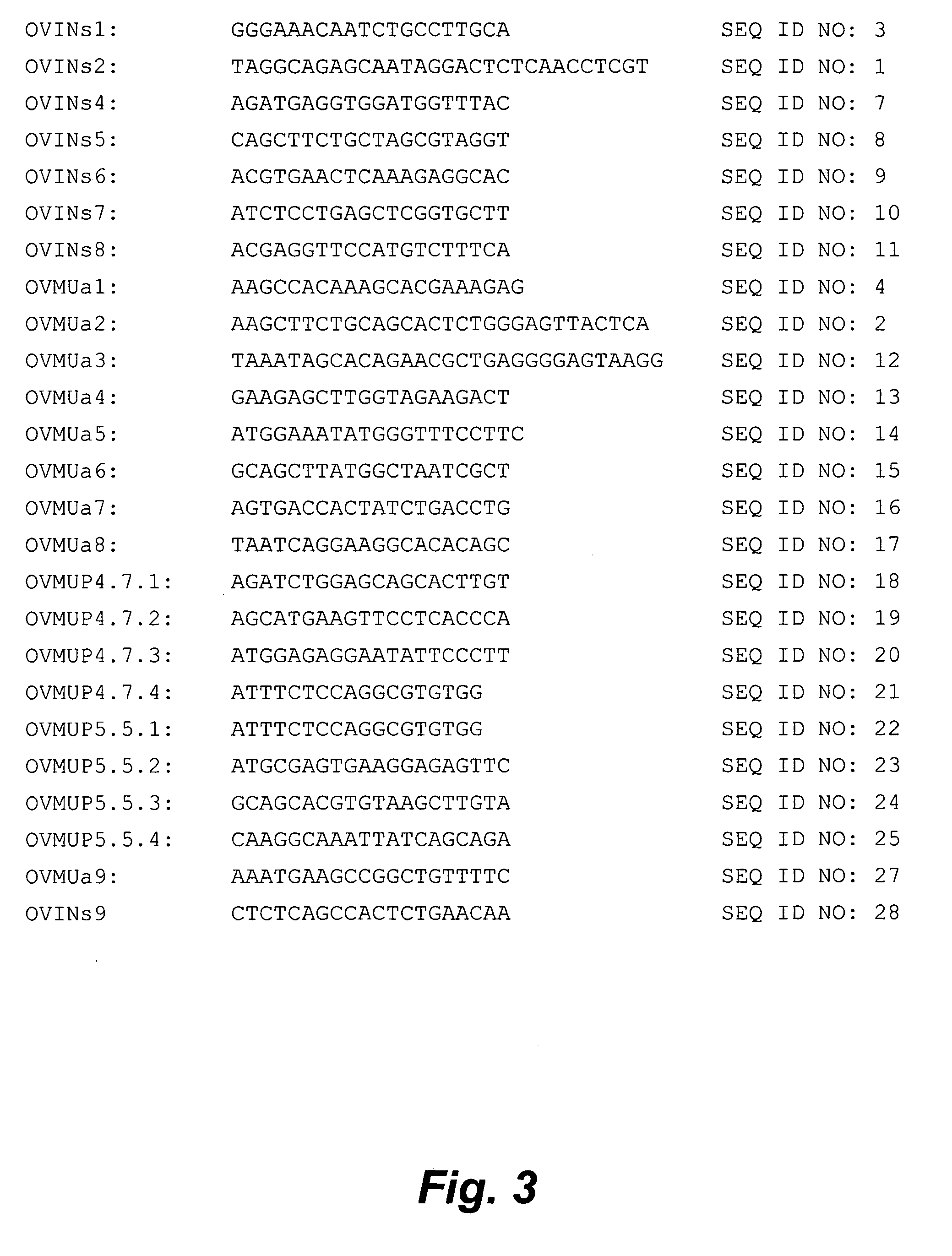Avian gene expression controlling regions
a gene expression and control technology, applied in the field of avian gene expression control, can solve the problems of large-scale herd maintenance, limited success of procedures, and high maintenance costs, and achieve the effect of increasing expression
- Summary
- Abstract
- Description
- Claims
- Application Information
AI Technical Summary
Benefits of technology
Problems solved by technology
Method used
Image
Examples
example 1
PCR Amplification of Ovomucoid Promoter
[0180] Sense primer OVINs2,5′-TAGGCAGAGCAATAGGACTCTCAACCTCGT-3′ (SEQ ID NO: 1) and the antisense primer, OVMUa2, 5′-AAGCTTCTGCAGCACTCTGGGAGTTACTCA-3′ (SEQ ID NO: 2) were designed according to the sequences of chick ovoinhibitor exon 16 (Genbank Accession No: M16141) and a fragment of the chick ovomucoid promoter region (Genbank Accession No: J00897) respectively. The template DNA for PCR amplification of the ovomucoid promoter region was prepared from white leghorn chick blood.
[0181] A series of different PCR conditions were carried out to optimize synthesis of the approximately 10.0 kb product. In these tests, the template DNA concentrations were 500 ng, 100 ng, 50 ng, or 10 ng. Two sets of primers, OVINs1 (SEQ ID NO: 3) and OVMUa1 (SEQ ID NO: 4), or OVINs2 (SEQ ID NO: 1) and OVMUa2 (SEQ ID NO: 2) shown in FIG. 3, three Mg++ concentrations (1.0 mM, 1.5 mM and 2.0 mM) and annealing temperatures from 50° C. to 70° C. were used.
[0182] The resu...
example 2
Cloning of PCR Products
[0184] The PCR products were purified by standard methods. Briefly, PCI (phenol: chloroform: isoamyl alcohol, 24:25:1) and chloroform extraction were performed once. The DNA was precipitated by adding 3M sodium acetate pH 5.2 to a final concentration of 0.3M together with 2.5 volumes of 100% ethanol. The DNA pellet was dried and dissolved in distilled deionized water and then sequenced on a ABI3700 automatic sequencer (Applied Biosystems, Foster City, Calif.) using the primers OVINs2 (SEQ ID NO: 1) and OVMUa2 (SEQ ID NO: 2) to confirm the identity of each PCR product. After confirmation of the identities, the approximately 10 kb PCR product was treated with T4 polynucleotide kinase to add a phosphate to the 5′ end. Mung bean nuclease removed any overhanging adenines from the ends of the PCR products, thereby producing a blunt end. The PCR product was purified by PCI and chloroform extraction and precipitated by standard methods. This approximately 10 kb produ...
example 3
Sequencing
[0188] The plasmids pBS-OVMUP4.7 and pBS-OVMUP5.5 were sequenced from both ends of each insert as shown in FIG. 2. The initial primers were T7 and T3 having the nucleic acid sequences 5′-TAATACGACTCACTATAGGG-3′ (SEQ ID NO: 5) and 5′-ATTAACCCTCACTAAAGGGA-3′ (SEQ ID NO: 6) respectively. Subsequent primers (SEQ ID NOS: 7-25), as shown in FIG. 3, were designed according to the sequence results as they became available. The approximately 10 kb sequence was edited and assembled by the ContigExpress software of the Vector NTI Suite, version 6.0 (InforMax, Inc.). The region of the approximately 10 kb PCR product described in Example 1 above that encompassed the Bam HI junction was sequenced using the primers OVMUa9 (SEQ ID NO 27) and OVINs9 (SEQ ID NO 28) (shown in FIG. 3).
[0189] Each sequence chromatogram was visually checked for sequence accuracy and to locate base ambiguities. Regions containing ambiguous bases were re-sequenced with the same primer or, if still ambiguous, wi...
PUM
| Property | Measurement | Unit |
|---|---|---|
| temperatures | aaaaa | aaaaa |
| temperatures | aaaaa | aaaaa |
| pH | aaaaa | aaaaa |
Abstract
Description
Claims
Application Information
 Login to View More
Login to View More - R&D
- Intellectual Property
- Life Sciences
- Materials
- Tech Scout
- Unparalleled Data Quality
- Higher Quality Content
- 60% Fewer Hallucinations
Browse by: Latest US Patents, China's latest patents, Technical Efficacy Thesaurus, Application Domain, Technology Topic, Popular Technical Reports.
© 2025 PatSnap. All rights reserved.Legal|Privacy policy|Modern Slavery Act Transparency Statement|Sitemap|About US| Contact US: help@patsnap.com



